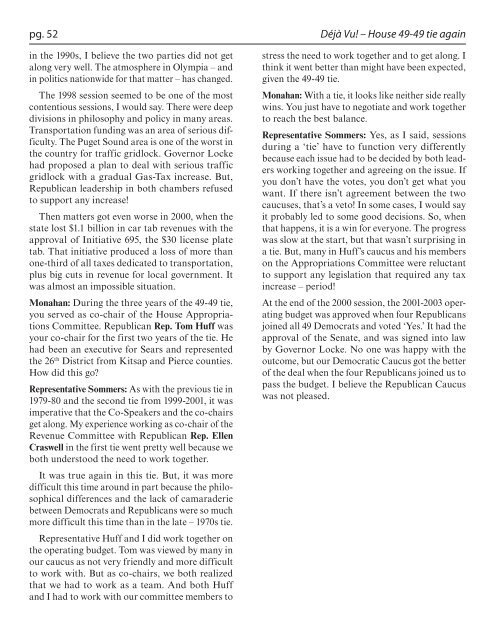Helen Sommers: An Oral History
Helen Sommers: An Oral History
Helen Sommers: An Oral History
You also want an ePaper? Increase the reach of your titles
YUMPU automatically turns print PDFs into web optimized ePapers that Google loves.
pg. 52 Déjà Vu! – House 49-49 tie again<br />
in the 1990s, I believe the two parties did not get<br />
along very well. The atmosphere in Olympia – and<br />
in politics nationwide for that matter – has changed.<br />
The 1998 session seemed to be one of the most<br />
contentious sessions, I would say. There were deep<br />
divisions in philosophy and policy in many areas.<br />
Transportation funding was an area of serious difficulty.<br />
The Puget Sound area is one of the worst in<br />
the country for traffic gridlock. Governor Locke<br />
had proposed a plan to deal with serious traffic<br />
gridlock with a gradual Gas-Tax increase. But,<br />
Republican leadership in both chambers refused<br />
to support any increase!<br />
Then matters got even worse in 2000, when the<br />
state lost $1.1 billion in car tab revenues with the<br />
approval of Initiative 695, the $30 license plate<br />
tab. That initiative produced a loss of more than<br />
one-third of all taxes dedicated to transportation,<br />
plus big cuts in revenue for local government. It<br />
was almost an impossible situation.<br />
Monahan: During the three years of the 49-49 tie,<br />
you served as co-chair of the House Appropriations<br />
Committee. Republican Rep . Tom Huff was<br />
your co-chair for the first two years of the tie. He<br />
had been an executive for Sears and represented<br />
the 26th District from Kitsap and Pierce counties.<br />
How did this go?<br />
Representative <strong>Sommers</strong>: As with the previous tie in<br />
1979-80 and the second tie from 1999-2001, it was<br />
imperative that the Co-Speakers and the co-chairs<br />
get along. My experience working as co-chair of the<br />
Revenue Committee with Republican Rep . Ellen<br />
Craswell in the first tie went pretty well because we<br />
both understood the need to work together.<br />
It was true again in this tie. But, it was more<br />
difficult this time around in part because the philosophical<br />
differences and the lack of camaraderie<br />
between Democrats and Republicans were so much<br />
more difficult this time than in the late – 1970s tie.<br />
Representative Huff and I did work together on<br />
the operating budget. Tom was viewed by many in<br />
our caucus as not very friendly and more difficult<br />
to work with. But as co-chairs, we both realized<br />
that we had to work as a team. <strong>An</strong>d both Huff<br />
and I had to work with our committee members to<br />
stress the need to work together and to get along. I<br />
think it went better than might have been expected,<br />
given the 49-49 tie.<br />
Monahan: With a tie, it looks like neither side really<br />
wins. You just have to negotiate and work together<br />
to reach the best balance.<br />
Representative <strong>Sommers</strong>: Yes, as I said, sessions<br />
during a ‘tie’ have to function very differently<br />
because each issue had to be decided by both leaders<br />
working together and agreeing on the issue. If<br />
you don’t have the votes, you don’t get what you<br />
want. If there isn’t agreement between the two<br />
caucuses, that’s a veto! In some cases, I would say<br />
it probably led to some good decisions. So, when<br />
that happens, it is a win for everyone. The progress<br />
was slow at the start, but that wasn’t surprising in<br />
a tie. But, many in Huff’s caucus and his members<br />
on the Appropriations Committee were reluctant<br />
to support any legislation that required any tax<br />
increase – period!<br />
At the end of the 2000 session, the 2001-2003 operating<br />
budget was approved when four Republicans<br />
joined all 49 Democrats and voted ‘Yes.’ It had the<br />
approval of the Senate, and was signed into law<br />
by Governor Locke. No one was happy with the<br />
outcome, but our Democratic Caucus got the better<br />
of the deal when the four Republicans joined us to<br />
pass the budget. I believe the Republican Caucus<br />
was not pleased.
















